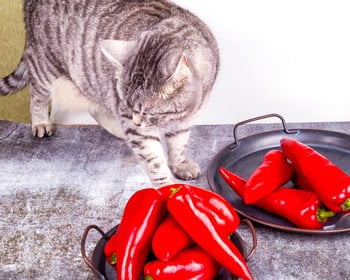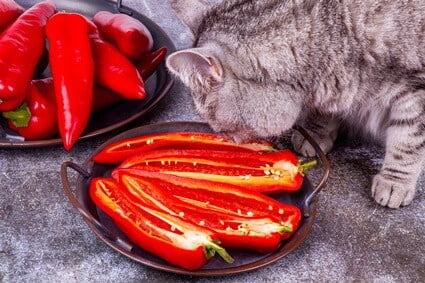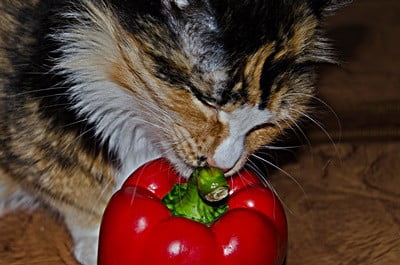Cats love rich and flavorful textures, especially if their owners enjoy eating that food. Spicy food for cats is no exception because it has a distinct scent that immediately captures a hungry cat’s attention. Spicy food is usually meat-based, making it a very enticing meal for felines, but is it safe?
No, cats can’t eat spicy food because it contains capsaicin, which causes gastrointestinal and digestive problems, such as upset stomachs, diarrhea, and vomiting. Also, spices can lead to a runny nose and watery eyes. Cats’ tongues can’t process the complex flavor of spices, so they can’t taste it.
Although spicy food is harmful to cats, many felines still show interest because they think they’ll enjoy it. This could be because cats like to imitate humans or the rich and tempting aroma. Regardless of the reason, feeding spicy food to cats should be avoided as there are no benefits.
Can Cats Taste Spicy Food?
Cats cannot process the taste of spices, but they can still experience all of its adverse effects, such as the burning hot heat.
The heat associated with spicy food comes from the chilies used in the recipe. Interestingly, humans use the capsaicin found in cayenne pepper as a cat repellent.
Eating spicy food won’t be a nice experience for cats. Once your cat tastes capsaicin, it’s unlikely to want anymore. If a cat smells a spicy meal in the future, it’ll remember the bad experience and stay away.
Unfortunately, that doesn’t always stop a curious cat from learning its lesson the hard way, as cats hate to think that they’re missing out on anything tasty.
What Happens When a Cat Eats Spicy Food?
Chilies contain capsaicin. When a cat chews chili, the capsaicin is released, which binds itself to the mouth in the location that registers pain. Very hot chili will leave a cat’s eyes streaming and nose running.
It’s not just its mouth that will be adversely affected when a cat eats spicy food. Spices can also adversely affect a cat’s digestive tract due to the capsaicin.
Once the Capsaicin compound has made itself known in your cat’s mouth, the pain that follows will encourage your cat to swallow or spit out the hot food.
If a cat chooses to spit the food out, it’ll experience no further ill effects. If a cat swallows spicy food, it’ll learn that capsaicin irritates the throat and stomach lining. The result will be vomiting, stomach pain, and diarrhea, which will continue until the chili’s effects finally pass.
There’s also a risk of dehydration if your cat experiences diarrhea.
Why Do Cats Like Spicy Food?
According to National Geographic, Chinese tree shrews are the only animal that enjoys consuming chili. If a cat cannot taste spicy food, and it causes them harm, why do some cats like to eat foods with spices?
Enticing Aroma
Cats eat with more than just their mouths, so the smell of food is just as crucial to a cat as the actual taste. That’s why so many felines will decline their favorite meals if the scent is somehow off.
Spicy food often has a powerful and unmistakable scent, which will capture your cat’s imagination. If you’re enjoying the meal, this will make your cat increasingly determined not to miss out.
Appealing Temperature
The temperature that the food is served makes it easy to eat, and few spicy meals will burn the mouth in terms of the temperature.
Texture of The Food
The meal will be tender and meat-based. If you order an Indian takeout, it’ll often feature lamb, beef, or chicken, which are all staples of a cat’s regular diet.
Even a dish such as a chili con carne will contain delicious, moist, and warm meat, which will remind your cat of prey that it consumes in the wild.
What Spicy Foods are Safe for Cats to Eat?
Never feed any spicy food to a cat, as it will have negative side effects.
Unfortunately, your cat may help itself to leftovers on the kitchen table. A pet sitter may allow a cat to lick their plate clean. If your cat wanders outside, it may feast on takeout containers in/near a bin.

Can Cats Eat Curry?
Cats will be drawn to this dish due to its strong aroma, but curry consumption must be avoided.
Curry is often served with rice, which is just empty carbs. More concerning are the ingredients that are used in the curry itself. Onion, garlic, and various spices will be found in a traditional curry.
Can Cats Eat Pepperoni?
How about a slice of pepperoni? Surely if you’re eating pizza, your cat can have some of this tasty meat? While felines are always interested in what you’re eating, many human foods are toxic to cats.
Pepperoni is seasoned with garlic and onions, which contain disulfides. This can cause hemolytic anemia, Heinz body anemia, and methemoglobinemia, damaging a cat’s red blood cells.
Can Cats Eat Jalapenos?
Jalapenos have a strong smell; they’re chewy and a good size for a cat’s mouth.
This could mean that your cat tries to take one from your plate. Jalapenos are bad for cats due to capsaicin, so they must be avoided.
Is Chili Con Carne Poisonous to Cats?
Chili con carne isn’t toxic, but it’ll badly upset your cat’s stomach.
Even red kidney beans can be bad for your cat if consumed in large quantities because they’re hard for your cat to digest, leading to gas and bloating.
Any carbohydrate accompaniment to chili con carne will also be devoid of nutritional value for cats.
Is Cinnamon Bad for Cats?
Cinnamon is a spice that’s non-toxic to felines if consumed in moderation. A quick lick from a spilled teaspoon is unlikely to cause any lasting harm.
However, if your cat devours a spicy meal that’s high in cinnamon, it’ll soon experience negative effects. Cinnamon contains coumarin, which is a compound that is often used in rat poison.
The symptoms of cinnamon poisoning in cats include:
- Vomiting and diarrhea
- Coughing, panting, and wheezing
- Slow and weak heart rate
- Skin irritation if exposed to powdered cinnamon
If left untreated by a veterinarian, your cat could experience liver failure.

Is Nutmeg Toxic to Cats?
According to the Pet Poison Helpline, nutmeg should be avoided because it contains myristicin.
Nutmeg can cause the following problems:
- Severe abdominal cramps
- Hallucinations
- Elevated heart rate
Your cat would need to consume a large amount of raw nutmeg to experience these side effects.
Will Onions and Garlic Make a Cat Sick?
If eaten in large quantities, onion and garlic can cause anemia.
Is Hot Sauce Bad for Cats?
Most of us will try anything to get a fussy cat to eat its food. Unfortunately, hot sauce should never be added to your cat’s meal to generate additional flavor.
Some cats seem to enjoy the burning sensation of spicy food, but it’ll likely make them feel nauseous afterward, so it should be avoided.
If our cat licks a spoon of hot sauce, it won’t do any lasting damage. This substance isn’t toxic or dangerous in moderation but could cause a stomach upset.
Herbs and Spices That Are Healthy for Cats
Small quantities of the following herbs can be beneficial:
- Thyme. Cat thyme is a germander that has a catnip-like effect on felines.
- Licorice. Licorice spice can open up the airways, soothe allergies, boost liver function, and ease arthritic inflammation.
- Peppermint, Rosemary, and Chamomile. These ground spices can soothe itchy skin.
- Ginger. Helps with stomach upsets and nausea in small portions.
Your cat may show an interest in the spicy food on your plate, but no good will come from a cat developing a taste for curry or chili con carne. The likely outcome is stomach upset, vomiting, or diarrhea.

